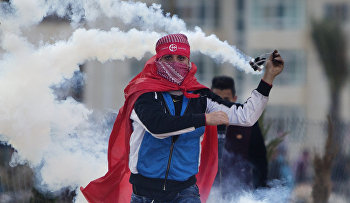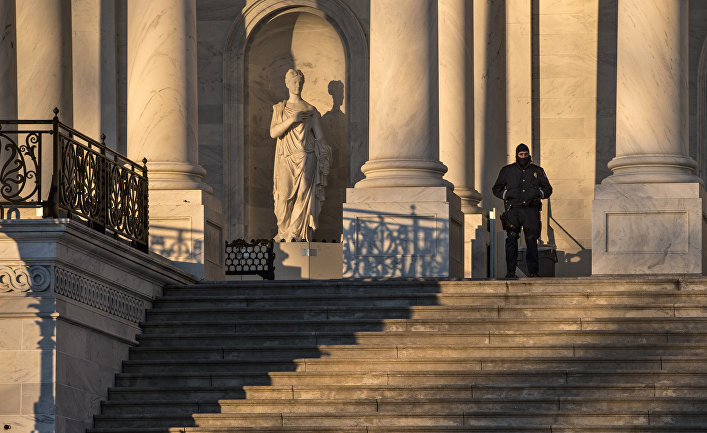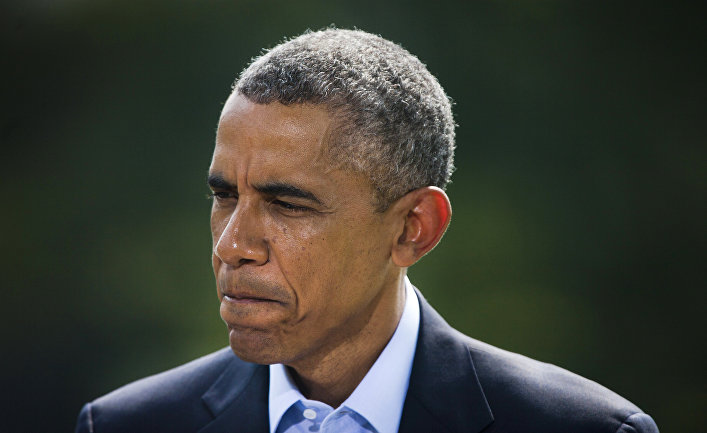Journalists in the US complain of the level of repression they have been subjected to by the Obama administration over recent decades. The phrase Lügenpresse ('lying media') has emerged in German-speaking countries. The credibility of even the most renowned media sources is at rock bottom. And thank goodness.
Obama was presented as the savior of the world – almost a Messiah. He was rapturously greeted by a crowd of over 200,000 in Berlin in 2008 – even before he had been officially crowned as President of the USA. “Yes, we can!” was the campaign slogan that electrified the crowd, even before he began speaking. The American presidential candidate gathered bigger crowds in Germany than even the Pope, rock stars, or a football game with the national team. He promised to liquidate nuclear arms, reestablish good relations with Russia, pull American troops out of Iraq and Afghanistan – and to close the US's nefarious concentration camp at Guantanamo Bay.
Incredible What #Obama's Gotten Away With: IRS, NSA, DOJ, OCare, Benghazi, Fast/Furious, VA. A Rep Pres Wld Have Long Since Been Gone #tcot
— John Betts (@JohnFromCranber) January 7, 2016
As the US's first black president, Barack Obama ought to have become the antithesis of everything that George “Dubya” Bush had stood for – a president whose wars had run through the world like cancer, whilst clamping down on basic freedoms for his own people. This was the way the media presented the incoming President Obama – and the world believed the simulacrum they'd been given. By the end of his first term in office, Obama had even been awarded the Nobel Peace Prize – despite doing nothing whatsoever to deserve it. It seemed a completely harmonious scenario – as far as the press was concerned.
What the press wasn't reporting, however, was that during that short period, Obama signed more orders for drone assaults than Bush Jr had done in the entire eight years of his presidency. These were drone strikes which caused catastrophic levels of non-combatant casualties, which America simply wrote-off under the euphemism of “collateral damage.” Like his predecessor, Obama threw all his weight behind GMO agriculture; he didn't give the slightest thought to his promises to close Gitmo; he showed no interest whatsoever in improving relations with Russia, and he worked actively on destabilizing the situation in the Middle East. Meanwhile, the incoming president declared his intentions, in 2009, for a previously unprecedented level of transparency in government and the apparatus of national administration. “Openness will strengthen our democracy,” as he stressed in subsequent legislation.
US — journalists in fear
Now that Obama has been at the helm for nearly seven years, it's clear that all these promises were empty piffle. No president after Richard Nixon has been so aggressively opposed to the media, as was highlighted in a piece written by the former Washington Post chief editor Leonard Downie, published in 2013 – about freedom of speech in the United States. Downie claimed the Obama administration was operating a misinformation policy, used electronic snooping on journalists, and was behind a ratcheted-up campaign of persecution against whistle-blowers and journalists involved in investigation. An atmosphere of fear pervaded the work of journalists, Downie claimed, with their investigations permanently occluded in secret observation by the state. Despite the administration's promises to end the “unreasonable secrecy” that typified the Bush era, Obama has in fact continued to expand it. Often entirely irrelevant documents are classified “top secret” so that reporters are systematically denied access to them.

On top of this, Obama administration staffers frequently take personal offense if articles criticizing government policy are published. To ward off the increasing frequency of such articles, the Obama administration is increasingly reaching out for the 1917 Espionage Act. Although it had only been employed three times in the first 90 years of its existence, over the period of 2009 to 2013 – the period of the Obama era – eight different government officials were arraigned with it, charged with passing governmental information to journalists, putting out a powerful resonance on Capitol Hill. One of those thus charged was Edward Snowden, who blew the whistle on government snooping on the whole world's population by the NSA Intelligence Service. Bob Woodward, who broke the news of the Watergate scandal in the Nixon era, warns that any fight against critical journalists only leads in the long term to the castration of the nation's national security.
US – using the surveillance like a totalitarian regime?
In reality, Obama has set up a unique system of surveillance. It was done in such a way that people around the world have no idea that Obama's policies are a continuation, or even a worsening of those of George W Bush. Since October 2011 government staffers in every branch of the administration have been encouraged to snitch on their colleagues. Staff in Federal departments have been obliged since 2012 to report all their contacts with the media, and moreover to report on suspicious colleagues. Michael Hayden, the former head of the CIA, said the program had been incepted to “block all contact.” Even staffers of new agencies who are remote from revolutionary activities, such as Associated Press or Fox News have come under the crosshairs of the Obama administration.
One such journalist has been James Rosen of the Fox News television channel, who came under observation from the Justice Department, for using information he had received from a highly-placed government official. The information referred to the international community ratcheting up sanctions against Pyongyang over new nuclear weapons testing by North Korea. The Washington Post claims that the FBI monitored Rosen's phone calls, and even screened his private email correspondence.
#NSA's COLLECTION without warrants on US persons is unconstitutional. Don't trust a politician who says keep collecting, just don't misuse.
— Justin Amash (@justinamash) January 5, 2016
The situation worsened severely in 2015. In a document titled “Instructions regarding military law,” the Pentagon stated that all journalists should in future be treated as “low-level combatants.” On the basis of this statement, the military would have the right to “at minimum, arrest journalists without charge, and without having to provide evidence of any kind, and commence legal process against them,” said a representative from the Committee for the Protection of Journalists (CPJ). If the Pentagon is putting spying in the same basket as journalism, the New York Times noted, then “this is a step in the same direction as totalitarian regimes.” It's hardly surprising that in the World Press Freedom Index for 2015, the USA is rated at 49 place – on a par with El Salvador, Burkina Faso and the Republic of Niger.
One well-known female American journalist has discussed how she was repressed by the Obama administration. In addition to being placed under surveillance, as a result of covert operations aimed at her computer she nearly ended in prison. Fellow journalists on both sides of the Atlantic have given numerous examples of how today's mainstream media has become debased, and instead now serves the propaganda interests of multinational corporations and financial tycoons. Political journalism is affected too – whether concerning smears of Russia's military operations, or a complete media blackout of anything which displeases governmental political elites.







